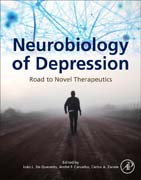
Neurobiology of Depression: Road to Novel Therapeutics
Quevedo, Joao
Carvalho, Andre F.
Zarate Jr., Carlos A.
Neurobiology of Depression: Road to Novel Therapeutics synthesizes the basic neurobiology of major depressive disorder with discussions on the most recent advances in research, including the interacting pathways implicated in the pathophysiology of MDD, omics technologies, genetic approaches, and the development of novel optogenetic approaches that are changing research perspectives and revolutionizing research into depression. These basic foundational understandings on the neurobiology underlying the disorder, along with a comprehensive summary of the most recent advances in research are combined in this book to aid advanced students and researchers in their understanding of MDD. Depression is one of the most common mental-health disorders caused by a variety of genetic, biological, environmental and psychological factors. Major depressive disorder (MDD) is typically treated with first-line antidepressant agents that primarily target monoamine neurotransmission. However, only approximately one-third of patients with MDD achieve remission following a trial with such an antidepressant. Furthermore, MDD is a heterogeneous phenotype, and new frameworks, such as the NIMH Research Domain Criteria (RDoC) may provide a more accurate, biologically based comprehension of the symptomatic heterogeneity of this devastating illness. Aids readers in understanding major depressive disorder in the context of NIMH Research Domain Criteria (RDoC) recommendationsCovers a range of existing and potential pharmacologic and non-pharmacologic treatment options, from lifestyle adjustments, to antidepressants and novel therapeuticsSynthesizes discussions on the cellular and molecular mechanisms underlying symptoms with the clinical aspects of depression INDICE: 1. The classification of depression: embracing phenotypic heterogeneity in the era of the RDoC 2. The role of environmental and psychosocial factors in depression 3. Cognitive dysfunction in depression: evidence, pathophysiology, and treatment 4. Anhedonia in depression: assessment, mechanisms, and therapeutics 5. Gene-environment interactions and epigenetics mechanisms in depression 6. The neurotrophic hypothesis of depression revisited: new insights and therapeutic implications 7. The monoamine hypothesis of depression revisited: could it mechanistically novel antidepressant strategies? 8. Neuro-immune interactions in depression: mechanisms and translational implications 9. The hypothalamic-pituitary-adrenal axis in depression: pathophysiological role and translational implications 10. Advances in the neurobiology of late-life depression 11. Advances in the neurobiology of pediatric depression 12. The long-lasting neurobiological scars of early life stress: implications to the neurobiology of depression 13. Animal models of depression: recent advances and limitations 14. More than a gut feeling: emerging roles of the microbiome in the pathophysiology and treatment of depression 15. Optogenetics: emerging insights to the neurobiology of depression 16. Mitochondrial dysfunction and oxidative stress: relevance to the pathophysiology and treatment of depression 17. Obesity and depression: shared pathophysiology and translational implications 18. Depression and cardiovascular risk: epidemiology, mechanisms and implications 19. Is depression associated with accelerated aging? Mechanisms and implications 20. Relationships between complicated grief and depression: relevance, pathophysiological mechanisms and implications 21. Neuroimaging abnormalities in depression: research synthesis and translational perspectives 22. Could depression be preventable? Evidence and perspectives 23. Treating depression in the era of precision medicine: challenges and perspectives 24. Diet and depression: from epidemiology to novel therapeutics 25. Exercise as a treatment of depression: evidence and neurobiological mechanisms 26. Antidepressants and suicidality: controversies and possible mechanisms 27. Novel neuromodulatory approaches for depression: neurobiological mechanisms 28. Electroconvulsive therapy for depression: neurobiological mechanisms 29. Deep brain stimulation: mechanisms underpinning antidepressant effects 30. Novel therapeutic targets for major depressive disorder 31. The search for fast-acting antidepressants: research synthesis and perspectives
- ISBN: 978-0-12-813333-0
- Editorial: Academic Press
- Encuadernacion: Rústica
- Páginas: 472
- Fecha Publicación: 01/03/2019
- Nº Volúmenes: 1
- Idioma: Inglés
